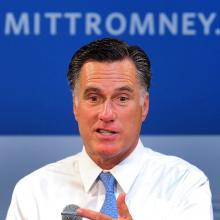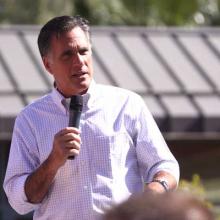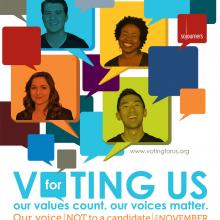Mitt Romney
Though Mitt Romney talks little about his faith on the campaign trail, he grew up in the Mormon Church and spent years as a top church leader in Massachusetts. From 1986 to 1994, he was president of the Boston stake, an entity similar to a Catholic diocese. Before that, Romney was bishop, similar to a lay pastor, of congregations in Belmont and Cambridge. Each job included both organizational work and counseling.
After leaving the stake president position, Romney taught Sunday school for a year, then oversaw the church’s programs for teenagers for around two years. Romney continues to tithe — giving 10 percent of his income to his church. In accordance with Mormon teachings, he does not drink alcohol, tea or coffee. He attends church services when he can. Romney's campaign did not respond to requests for comment on this story.
As a church leader, Romney ran the church with businesslike efficiency.
“He was very serious about doing an excellent job about things and he didn’t suffer fools,” said Helen Claire Sievers, executive director for the Harvard-affiliated WorldTeach, who was active in the church when Romney was stake president.
WASHINGTON — Neither Mitt Romney’s trip to Israel Saturday nor President Obama’s Middle East policies will have much effect on Jewish voters this fall, according to a new report that says Jewish voting patterns are predictable and unchanging.
The report, “Making Sense of the Jewish Vote,” predicts Jewish Americans will follow historical precedent and largely vote Democrat this fall. Moreover, Jewish voters will have a negligible effect on the presidential election’s outcome, even in swing states, said Jim Gerstein, a pollster with polling firm GBA Strategies who compiled the report.
Still, the Republican Jewish Coalition recently announced a multimillion-dollar advertising campaign targeting Jewish voters in swing states Pennsylvania, Florida and Ohio. “My Buyer’s Remorse” features testimonials decrying Obama’s posture toward Israel and economic policies.
Stephen Mansfield, an evangelical author who has written widely about the faith of politicians, turns his attention to Mormons in his latest book, The Mormonizing of America.
He talked with Religion News Service about how the Church of Jesus Christ of Latter-day Saints — including GOP presidential candidate Mitt Romney — has progressed from persecution to prominence.
The interview has been edited for length and clarity.
Q: You’ve written “The Faith of George W. Bush” and The Faith of Barack Obama. Why did you write “The Mormonizing of America” instead of “The Faith of Mitt Romney”?
A: I thought that the story of Bush at the time was bigger than the story of evangelicals and the religious right at that time. I thought the story of Obama personally was bigger then the story of the religious left that he was sort of the champion of. But in this case I think that the story of the Mormon moment or this Mormon ascent is a bigger story than Mitt Romney. There’s something broader going on and he’s not so much the champion of the movement, maybe just at the vanguard of it....
As Americans celebrate the nation’s founding, some Mormons may outdo their neighbors in fireworks, fanfare, and frenzy to express their outsized patriotism.
Love of America, they believe, stretches beyond appreciation and gratitude. It is theological, prescribed in holy writ.
When it comes to American exceptionalism, Sen. Mike Lee (R-Utah) recently said, “Mormons sort of have an extra chromosome.”
Presidential candidate Mitt Romney repeatedly lauds the crucial role this country has to play in human history.
Most Mormons in Utah believe that Mitt Romney’s rise to become the likely GOP presidential nominee is a good thing for the Church of Jesus Christ of Latter-day Saints. But many do not trust the media to cover the church fairly, according to a new poll released on June 25.
The study, conducted by Key Research and Brigham Young University’s Center for the Study of Elections and Democracy, is believed to be the first to gauge Mormons’ reaction to Romney’s barrier-breaking achievement. He is the first Mormon to clinch the presidential nomination of a major U.S. political party.
More than eight in 10 Utah Mormons said they are “very excited” or “somewhat excited” about Romney’s feat. Nearly as many (77 percent) said his nomination is a good thing for the LDS church; just 2 percent told pollsters it was a negative development.
Nearly one in five Americans say they would not vote for a Mormon president, a percentage that has hardly budged since 1967, according to a new Gallup poll.
It is unclear how the anti-Mormon bias will affect Mitt Romney, the presumed GOP presidential nominee, Gallup said, since just 57 percent of Americans know that he is a member of the Church of Jesus Christ of Latter-day Saints.
“This suggests the possibility that as Romney's faith becomes better known this summer and fall, it could become more of a negative factor,” Gallup writes, “given that those who resist the idea of a Mormon president will in theory become more likely to realize that Romney is a Mormon as the campaign unfolds.”
Twenty years ago, who would have predicted the 2012 U.S. presidential race would pit a black incumbent against a white Mormon?
"I’ve been black my whole life and a Mormon for 30 years and never thought either of these (candidacies) would happen in my lifetime," says Utah attorney Keith Hamilton.
"This is a day that all Americans should take some solace in — that things are changing. Regardless of who wins, this sends a message to our children."
When Romney delivered his “Faith in America” speech in 2007, the Southern Baptist response was to label Mormonism a “theological cult” and “false religion.”
What's surprising in 2012 is the relative lack of anxiety on the other side, among evangelicals who for years considered Mormonism a "cult" that was to be feared, not embraced.
In fact, the relative ambivalence among prominent evangelicals about this new "Mormon moment" -- and the fact that Romney's campaign could mainstream Mormonism right into the Oval Office – could radically shift the dynamics on America's political and religious landscape.
Writing for The Washington Post's On Faith blog, David Mason argues:
"Conservative Christians are starting to line up behind Mormon Republican presidential candidate Mitt Romney. But they’re not doing so comfortably, and not without clinging to a last, non-negotiable condition that, ironically, makes the conservative Christian voting bloc the force most responsible these days for the secularization of America."
Read more here
Mitt Romney clinched the GOP presidential nomination on May 28, becoming the first Mormon selected by a major political party. But will his barrier-breaking faith be a boon or bane to his White House campaign?
The answer to that question could presage the next president, and two studies published in May come to contradictory conclusions.
In both studies people were given information about Romney and his Church of Jesus Christ of Latter-day Saints, then asked whether they would be more or less likely to vote for him.

Mitt Romney speaking in Detroit, Feb. 2012. Photo via Wylio http://bit.ly/KqqDbi
It's no wonder that Mitt Romney won plaudits from evangelical bigwigs for his commencement speech at Liberty University on Saturday. It showed he's learned how to talk to them--or at least, learned to listen to the people who know how he's supposed to talk to them.
When he was running for president last time, Romney told the bigs that he was pretty much like them in considering Jesus his Lord and Savior. But if there's anything evangelicals don't like, it's Mormons claiming to be Christians like them. Then he gave a speech declaring that, like a presidential candidate half a century earlier, he did not "define my candidacy by my religion. A person should not be elected because of his faith nor should he be rejected because of his faith." But evangelicals (these days) don't much believe in Kennedyesque separation of faith and public office.
Mitt Romney on Saturday delivered the commencement speech at Liberty University. The Los Angeles Times has video and the full transcript of the speech.
Read full transcript HERE.
Dan Gilgoff and other religion reporters examine why social issues will continue to shape the narrative of the 2012 election:
"Everyone knows the 2012 presidential race is about jobs and the economy. As likely Republican nominee Mitt Romney said a couple weeks ago: “It’s still about the economy, and we’re not stupid.” But have you noticed how the culture wars keep intruding into this it’s-all-about-the-economy election?"
Learn more here
Glenn Kessler, writer of the Washington Post Factchecker column, issues a challenge to President Obama and Gov. Mitt Romney:
"With the presidential election looming in exactly six months, I would like to issue a challenge to you both: Give at least one campaign speech, on a substantive policy issue, lasting at least 15 minutes, that does not contain a single factual error or misstatement. That means no sugar-coating of your record, no exaggerated claims about your opponent’s record, and no assertions that are technically true but lack crucial context."
I’m not holding my breath for the challenge to be accepted.
Over at Salon.com, Jordan Michael Smith tells us, 'The Bushies Are Back':
Republicans lost their popularity on security issues for one reason: George W. Bush’s foreign policy was a disaster. And yet, the party’s nominee, Mitt Romney, has assembled a foreign-policy team composed almost exclusively of individuals with the same war-always mentality and ideology that served Bush — and the United States — so poorly. In some cases, the exact same men responsible for Bush’s catastrophic national security policies are advising Romney.
Read Smith's full article here
Business Insider reported last night:
"I think it's probably going to be a long time before Gov. Romney hires another homosexual activist to a prominent position in his campaign," Fischer said. "And that's good news if you're in the pro-family community."
Read the whole story here
In the 2012 race for the presidency, religious voters will continue to be watched closely.
According to Gallup’s latest poll, Mitt Romney leads Barack Obama by 17 points among “very religious voters.” These voters are those who attend religious services on a weekly basis (or nearly every week), and are estimated to constitute 41 percent of registered voters.
On the other hand, the report shows that Barack Obama has a 14 point lead among “moderately religious voters” and a 31 point lead among “non-religious voters.”
But this really isn’t anything new. Gallup reports that these findings “reinforce a basic pattern in American voting behavior that has been evident for decades.” The highly religious favor the Republican, the not-quite-as-religious favor the Democrat. This also confirms previous Gallup findings in their "state of the state" report, last month.
For a lot of voters, President Barack Obama’s tenure hasn’t turned out quite as they hoped. On the other side, the presumptive GOP nominee, Gov. Mitt Romney, isn’t the candidate that many voters seem ready to believe in.
Traditional political parties are in decline. In December 2011, Gallup reported that 45 percent of the U.S. population identified as politically independent. At the same time, the direction of our two parties is more and more influenced by political movements like the Tea Party and Occupy Wall Street.
While there is an unprecedented level of money flowing into elections from wealthy donors, corporations and unions, social media has democratized access to fellow voters. You can spend millions of dollars buying airtime on traditional TV stations—but it is entirely possible to craft a compelling message that will reach millions for a relatively small cost.
A politically disillusioned electorate and a huge influx of money for attack ads will be a challenge to our country’s democratic processes. The danger, especially for my generation, is to tune out from political and civic engagement entirely.
The opportunity is post-candidate politics.
A new survey released today shows that President Barack Obama holds a narrow lead over Gov. Mitt Romney in economic issues among voters—a topic that eight in 10 voters believe to be very important.
The Pew Forum on Religion and Public Life reports that on economic issues, 49 percent of voters favor Obama while 45 percent favor Romney. In these statistics, Romney holds a 53-point lead among white evangelicals and a 20-point lead among white Catholics, while Obama garners strong support from black Protestants and the religiously unaffiliated.
As voters head to the polls in November, numbers show that for many voters, issues of employment and the economy will take priority over social issues like gay marriage and abortion.
WASHINGTON -- With Rick Santorum’s exit from the White House race, Mitt Romney stands on the cusp of history as the first Mormon to appear at the top of a major party ticket in a general presidential election. Romney, a Brigham Young University-educated, Mormon-family scion and beloved Utah figure, is now the inevitable Republican nominee and will take on President Obama this fall.
The news is sure to bring a surge of excitement unseen in Utah since Romney led the triumphant 2002 Winter Olympics in Salt Lake City and helped usher the state — and the Mormon Church — onto the world stage.
“Romney has family here, he’s lived here, he’s worked here, he went to school here,” says Rep. Jason Chaffetz, a Utah Republican who has campaigned this year with the former Massachusetts governor. “It feels like he’s one of us.”









